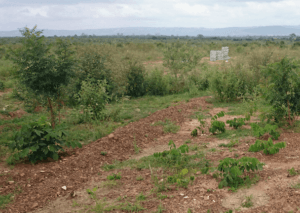Securing women’s land rights advances equity in our communities
 The African Union (AU) Declaration on Land Issues and Challenges, the AU Declaration of committing 2010 – 2020 as the African Women’s Decade and the AU 30 per cent target for documented land rights in women’s names by 2025, are important messages from leaders on the continent that empowering women through tenure security is a necessary condition for equity and the socioeconomic and agricultural transformation of Africa. But the declarations must be turned into action at the national and community levels with each institution at national, regional and continental level playing its role.
The African Union (AU) Declaration on Land Issues and Challenges, the AU Declaration of committing 2010 – 2020 as the African Women’s Decade and the AU 30 per cent target for documented land rights in women’s names by 2025, are important messages from leaders on the continent that empowering women through tenure security is a necessary condition for equity and the socioeconomic and agricultural transformation of Africa. But the declarations must be turned into action at the national and community levels with each institution at national, regional and continental level playing its role.
Globally, gender shapes the experience, opportunities, constraints, rights, and obligations of men and women through social and cultural practices and attitudes. It determines tenure security through power dynamics in land governance systems and practices. To reform land governance in Africa so that it is responsive to women and how they relate with land and its resources, nations ought to pay attention to policy and legislative frameworks and align them appropriately taking into account gender dimensions. Similarly, there ought to be investment in public education to shift attitudes and practices that undermine women’s land rights.
The legal pluralism that governs women’s land rights is characterized by inconsistencies which inadvertently undermine women’s rights to land and property. Secure land rights for women require a gender-responsive property rights framework beyond land laws. Therefore, harmonizing inconsistencies across and within land governance systems and practices so that they are aligned with the principles of equity and fairness is critical to strengthening women’s land rights.
Another area which requires particular attention relates to research and data on women’s land rights in order to understand underlying factors, patterns, effect on agricultural productivity and accounting for the particular needs of women. Without sufficient data, institutions mandated to address land governance concerns are likely to perpetuate inequalities and normalize gender discrimination in the land sector.
Women’s land rights are characterized by multiple interlocking systems and practices. These include formal laws, customary laws and practices, religious law, socioeconomic factors and intra-household dynamics. Therefore, tackling gender inequality in land relations requires systematic identification of political, legal, cultural and socio-economic gender -specific constraints to women’s land rights and understanding the interplay between the various dimensions. The analysis must not only account for external threats, but also capture intra-community threats to women’s land rights. Furthermore, it must reflect on the intra-gender dimensions as women’s experiences are also defined by other social characteristics such as ethnicity, religion and marital status. Recognizing the heterogeneity of women will account for the variables effecting women’s rights to land and highlight the particular land-related vulnerabilities of some categories of women, such aswidows and single mothers.
We know that throughout Africa, rural women contribute significantly tohousehold food production and commercial agriculture and are active players in food marketing and processing within cottage industries. But they also face considerable challenges related to the rights to access, control or own land. Research on women’s land rights can facilitate systematic accounting of existing gender inequalities by explicitly integrating the significance of gender in land governance and accounting for the specific needs of women. Failing to do so is likely to reinforce existing gender inequalities around land rights
Women’s land related vulnerabilities are often exacerbated by the effects of climate change, land related conflicts, scarcity and degradation of agricultural lands, large-scale land-based investments, unplanned urbanization and rapid population growth. The fact that women hardly sit in decision making forums means that they do not get opportunities to negotiate and ensure that their land rights are protected at all times. Considering the incessant hunger for land, we need to pay particular attention to women’s land rights in their various contexts.
With secure land rights, women acquire the foundation for food production and income generation, collateral for credit from financial institutions, and investment opportunities for themselves and their families. The land rights give them dignity, identity and status in the community and build their self-esteem and confidence. These are necessary attributes for social and economic well-being.
These land reforms ought to go hand in hand with attitudinal and behaviour change at all levels of society. Well-designed, targeted and executed media and dialogue approaches that entertain and educate have potential to increase knowledge and change behaviour in households and communities about land rights. Additionally, gender-responsive training of land professionals and policy makers in government, private sector, traditional leadership structures and civil society would ensure that policies that undermine women’s land rights including ownership, control and access are put aside to pave the way for more inclusive ones.
By Josefa Sacko,
African Union Commissioner,
Department of Rural Economy and Agriculture
Source: ECA
